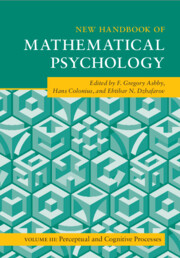Book contents
- Frontmatter
- Contents
- Contributors
- Preface
- 1 Principles and Consequences of the Initial Visual Encoding
- 2 Measuring Multisensory Integration in Selected Paradigms
- 3 Fechnerian Scaling: Dissimilarity Cumulation Theory
- 4 Mathematical Models of Human Learning
- 5 Formal Models of Memory Based on Temporally-Varying Representations
- 6 Statistical Decision Theory
- 7 Modeling Response Inhibition in the Stop-Signal Task
- 8 Approximate Bayesian Computation
- 9 Cognitive Diagnosis Models
- 10 Encoding Models in Neuroimaging
- Index
5 - Formal Models of Memory Based on Temporally-Varying Representations
Published online by Cambridge University Press: 20 April 2023
- Frontmatter
- Contents
- Contributors
- Preface
- 1 Principles and Consequences of the Initial Visual Encoding
- 2 Measuring Multisensory Integration in Selected Paradigms
- 3 Fechnerian Scaling: Dissimilarity Cumulation Theory
- 4 Mathematical Models of Human Learning
- 5 Formal Models of Memory Based on Temporally-Varying Representations
- 6 Statistical Decision Theory
- 7 Modeling Response Inhibition in the Stop-Signal Task
- 8 Approximate Bayesian Computation
- 9 Cognitive Diagnosis Models
- 10 Encoding Models in Neuroimaging
- Index
Summary
The idea that memory behavior relies on a gradually changing internal state has a long history in mathematical psychology. This chapter traces this line of thought from statistical learning theory in the 1950s, through distributed memory models in the latter part of the twentieth century and early part of the twenty-first century through to modern models based on a scale-invariant temporal history. We discuss the neural phenomena consistent with this form of representation and sketch the kinds of cognitive models that can be constructed and connections with formal models of various memory tasks.
Keywords
Information
- Type
- Chapter
- Information
- New Handbook of Mathematical Psychology , pp. 218 - 264Publisher: Cambridge University PressPrint publication year: 2023
Accessibility standard: Unknown
Why this information is here
This section outlines the accessibility features of this content - including support for screen readers, full keyboard navigation and high-contrast display options. This may not be relevant for you.Accessibility Information
- 2
- Cited by
